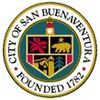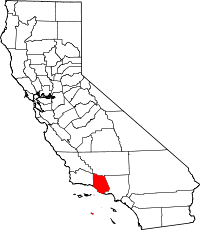Ventura, California
| Ventura | |||
|---|---|---|---|
| — City — | |||
| City of San Buenaventura | |||
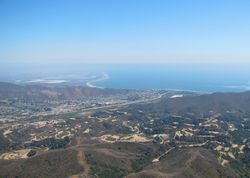 |
|||
|
|||
_Highlighted.svg.png) |
|||
 Ventura
|
|||
| Coordinates: | |||
| Country | United States | ||
| State | California | ||
| County | Ventura | ||
| Government | |||
| - Mayor | William (Bill) Fulton | ||
| - Senate | Tony Strickland (R) | ||
| - Assembly | Pedro Nava (D) | ||
| - U. S. Congress | CA-23: Lois Capps (D) CA-24: Elton Gallegly (R) |
||
| Area | |||
| - Total | 32.7 sq mi (84.6 km2) | ||
| - Land | 21.1 sq mi (54.6 km2) | ||
| - Water | 11.6 sq mi (30.0 km2) | ||
| Population (2006) | |||
| - Total | 106,744 | ||
| - Density | 4,789.7/sq mi (1,849.3/km2) | ||
| Time zone | PST (UTC-8) | ||
| - Summer (DST) | PDT (UTC-7) | ||
| ZIP code | 93001-93007, 93009 | ||
| Area code(s) | 805 | ||
| Website | cityofventura.net | ||
San Buenaventura, commonly referred to as Ventura, is the county seat of Ventura County, California, United States, incorporated in 1866. Ventura has a population of 106,744.[1] Ventura is accessible via U.S. Route 101, State Route 33, and State Route 126.
Contents |
History

Father Junípero Serra founded Mission San Buenaventura in 1782,[2] forming the basis of what would become the city. The mission was named for St. Bonaventure, a Thirteenth Century Franciscan saint and a Doctor of the Church. On July 6, 1841, Governor Juan Bautista Alvarado granted Rancho San Miguel to Felipe Lorenzana and Raymundo Olivas,[3] whose Olivas Adobe on the banks of the Santa Clara River was the most magnificent hacienda south of Monterey.
After the American Civil War, settlers came to the area, buying land from the Mexicans, or simply as squatters. Vast holdings were later acquired by Easterners, including the railroad magnate, Thomas Scott. He was impressed by one of the young employees, Thomas R. Bard, who had been in charge of train supplies to Union troops, and Bard was sent west to handle Scott's property.
Not easily accessible, Ventura was not a target of immigrants, and as such, remained quiet and rural. For most of the century which followed the incorporation of Ventura in 1866, it remained isolated from the rest of the state.
Bard is often regarded as the Father of Ventura and his descendants have been prominently identified with the growth of Ventura County. The Union Oil Company was organized with Bard as President in 1890, and has offices in Santa Paula. The large Ventura Oil Field was first drilled in 1919 and at its peak produced 90,000 barrels per day (14,000 m3/d). The city is located between the Ventura River and the Santa Clara River, leading to soil so fertile that citrus grew better here than anywhere else in the state. The citrus farmers formed Sunkist Growers, Incorporated, the world's largest organization of citrus production.
From the south, travel by auto was slow and hazardous, until the completion of a four-lane freeway (US Highway 101) over the Conejo Grade in 1959. This route, now further widened and improved by 1969, is known as the Ventura Freeway, which directly links Ventura with the Los Angeles metropolitan area. Another route, US Highway 101 ALT (now the Pacific Coast Highway) traveled along the coast from Santa Monica via Oxnard, but was not heavily used.
From the north, entrance was by way of a single road along the beach and stagecoach passengers either had to wait until low tide when the horses could cross on the exposed wet sand, or go up the Ventura River Valley and then cross over the mountains to Santa Barbara via Casitas Pass, a long and difficult trip.
Inland, Ventura was hemmed in by (what is now) the Los Padres National Forest, composed of mountainous country and deep canyons. This route became passable with the completion of the Maricopa Highway (Hwy 33) in the 1930s.
Since then, Ventura has grown steadily. In 1920 there were 4,156 people. In 1930 the population had increased to 11,603, by 1950 the population reached 16,643, by 1970 the population was 57,964, and in 1980 the population had increased to 73,774. In the last three decades it has increased to approximately 107,000.
Points of interest
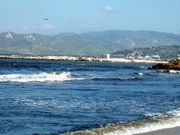
Ventura has some of the best surfing in Southern California, especially Surfer's Point at Ventura County Fairgrounds. Downtown Ventura is home to the Mission San Buenaventura, museums, galleries, dining, and shopping. Primary areas of activity include California Street and Main Street between Ventura Avenue and Fir Street. Located in downtown is the historic Ortega Adobe, home to the Ortega family, now famous for their chile products. Numerous thrift stores contrast with high-end shops and restaurants. Downtown Ventura is also home to the Ventura's ornate city hall building with its signature statue of Junipero Serra. Downtown now features numerous restaurants, winebars and the internationally acclaimed Rubicon Theatre Company.
A 4,300-square-foot (400 m2) Ventura Visitors Center is located at 101 S. California Street, in downtown and features exhibits on the Heritage Valley, Channel Islands National park, local arts scene and maps and guide books on the area.
One of the most recognizable land marks in Ventura is a site known as two trees. These are two lone trees that stand on a hill and can be seen from most of Ventura.
In Plaza Park (Chestnut and Santa Clara Streets, downtown) one of the nations largest Moreton Bay Fig Trees is marked with an historic plaque. Across the street is the main post office with WPA murals on its interior walls.
The Ventura Harbor is home to fishing industry, seafood restaurants and a shopping village at Ventura Harbor Village; it is famous for shops such as The Glass Touch and restaurants such as Milano's and World Famous Hicees BBQ. Home to two of Ventura Counties favorite blues bands, the legendary Blue Stew and the offspring of that group, Baby Sister. The Channel Islands National Park Headquarters is also located in this harbor, and boats to the Channel Islands depart from there daily.
Pierpont Bay (Pierpont) is the residential neighborhood along the one mile stretch between the Ventura Harbor and San Buenaventura State Beach. Reclaimed marshland was subdivided in 1925 with sluggish sporadic development through years of economic depression, wars, and two coastal floods (in 1937 and 1962). Formerly a hodge-podge of mostly rentals, weekend cottages and vacant lots, each of California's real estate booms brought surges of development and renovation and now Pierpont is mostly owner-occupied with an equal number of large, high-quality homes and older modest beach cottages. A lack of planning has left Pierpont with an apparent identity crisis, with widely varying architectural styles, a poorly implemented commercial area along Seaward Avenue, a noticeable lack of city maintenance, even next to multi-million dollar homes, and continuous conflicts regarding regulation of the neighborhood's public beach areas. Conflicts are likely to increase in the near future, with plans for high-density development along already-crowded streets, and with State officials beginning to exercise authority along beaches that have been mostly self-regulated for the last eighty years.
The Ventura County Fairgrounds is the home of the annual Ventura County Fair, and over the years has hosted such acts as Jimi Hendrix, The Grateful Dead, and Smokey Robinson.
The Derby Club at the Ventura County Fairgrounds offers Horse Racing Live via Satellite, and full service bars and restaurants.
The Ventura County Fairgrounds is also the home of Ventura Raceway, "The best little dirt track in America".[4][5]
The Ventura County Fairgrounds also serves as a Train Station for Amtrak's Pacific Surfliner route
The Vans Warped Tour also stops yearly at the Ventura County Fairgrounds with line ups including bands such as Yellowcard, Pepper and Avenged Sevenfold.
The Olivas Adobe, one of the early California Rancho homes, is operated today as a museum and performing arts venue. Located adjacent to the Olivas Park Golf Course, the home is one of the most visited historic sites on the central coast. Living history reinactments, demonstrations of Rancho life, and wonderful ghost stories abound. A summer music series of performances held in the old home's courtyard feature an eclectic assortment of artists from blues to jazz to country.
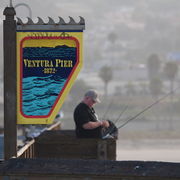
Perry Mason creator Erle Stanley Gardner had a law practice and did much of his early writing in Downtown Ventura. The building where his law offices were housed, at California and Main Street bears his name on a historical marker.
Many films including Swordfish, Little Miss Sunshine, Chinatown, Erin Brockovich, The Aviator, and The Rock were partly filmed in Ventura.
Downtown Ventura also hosts the Majestic Ventura Theater, a beautiful early century theatre, which is situated about two blocks away from city hall. It serves as a venue for concerts. The theater has seen many bands such as Gregg Allman, John Prine, The Doors, Devo, Van Halen, X, Paramore, She Wants Revenge, Pennywise, Red Hot Chili Peppers, Lamb of God, Social Distortion, Bad Religion, Thrice, Avenged Sevenfold, Fugazi, Incubus, Tom Petty, America, They Might Be Giants, and Modest Mouse, as well as successful local artists such as Army of Freshmen, Big Bad Voodoo Daddy, Gregory Hillman, Bruce Kimmell, Shim Come Quick
The headquarters for outdoor clothing manufacturer Patagonia is located downtown. There was an organic clothing retailer on Main Street called Korazon Organics (now out of business) and the eco-designer Stewart+Brown has their factory just a few blocks from the ocean. Chic diaper bag manufacturer Petunia Pickle Bottom is headquartered near downtown Ventura.
Geography and climate
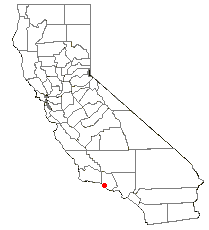
Ventura is located northwest of Los Angeles on the California coast and at (34.275242, -119.228048).[6]
According to the United States Census Bureau, Ventura has a total area of 32.7 mi² (84.6 km²). 21.1 mi² (54.6 km²) of it is land and 11.6 mi² (30.0 km²) of it (35.49%) is water.
Ventura River is at its western boundary and the Santa Clara River at its southern edge. [1][7]
| Climate data for Ventura, California | |||||||||||||
|---|---|---|---|---|---|---|---|---|---|---|---|---|---|
| Month | Jan | Feb | Mar | Apr | May | Jun | Jul | Aug | Sep | Oct | Nov | Dec | Year |
| Record high °F (°C) | 88 (31.1) |
91 (32.8) |
94 (34.4) |
100 (37.8) |
98 (36.7) |
102 (38.9) |
94 (34.4) |
97 (36.1) |
103 (39.4) |
103 (39.4) |
98 (36.7) |
96 (35.6) |
103 (39.4) |
| Average high °F (°C) | 66 (18.9) |
66 (18.9) |
65 (18.3) |
68 (20) |
68 (20) |
70 (21.1) |
73 (22.8) |
74 (23.3) |
74 (23.3) |
73 (22.8) |
70 (21.1) |
66 (18.9) |
69 (20.6) |
| Average low °F (°C) | 45 (7.2) |
47 (8.3) |
48 (8.9) |
50 (10) |
53 (11.7) |
56 (13.3) |
59 (15) |
60 (15.6) |
59 (15) |
55 (12.8) |
49 (9.4) |
45 (7.2) |
48 (8.9) |
| Record low °F (°C) | 29 (-1.7) |
28 (-2.2) |
31 (-0.6) |
35 (1.7) |
39 (3.9) |
42 (5.6) |
44 (6.7) |
46 (7.8) |
42 (5.6) |
37 (2.8) |
33 (0.6) |
29 (-1.7) |
28 (-2.2) |
| Rainfall inches (mm) | 3.41 (86.6) |
3.90 (99.1) |
3.04 (77.2) |
0.72 (18.3) |
0.21 (5.3) |
0.05 (1.3) |
0.02 (0.5) |
0.07 (1.8) |
0.36 (9.1) |
0.36 (9.1) |
1.37 (34.8) |
2.11 (53.6) |
15.62 (396.7) |
| Source: http://www.weather.com/outlook/travel/businesstraveler/wxclimatology/monthly/graph/USCA1193 | |||||||||||||
Demographics
As of the census[8] of 2000, there were 100,916 people, 38,524 households, and 25,233 families residing in the city. The population density was 1,849.3/km² (4,790.6/mi²). There were 39,803 housing units at an average density of 729.4/km² (1,889.5/mi²). The racial makeup of the city was 78.79% White, 1.41% African American, 1.16% Native American, 3.00% Asian, 0.17% Pacific Islander, 11.14% from other races, and 4.32% from two or more races. Hispanic or Latino of any race were 30.35% of the population.

There were 38,524 households out of which 32.1% had children under the age of 18 living with them, 49.2% were married couples living together, 11.7% had a female householder with no husband present, and 34.5% were non-families. 26.5% of all households were made up of individuals and 9.7% had someone living alone who was 65 years of age or older. The average household size was 2.56 and the average family size was 3.12.
In the city the population was spread out with 25.0% under the age of 18, 7.8% from 18 to 24, 31.5% from 25 to 44, 22.8% from 45 to 64, and 12.8% who were 65 years of age or older. The median age was 37 years. For every 100 females there were 96.9 males. For every 100 females age 18 and over, there were 93.8 males.
The median income for a household in the city was $52,297, and the median income for a family was $60,466. Males had a median income of $43,828 versus $31,793 for females. The per capita income for the city was $25,065. About 6.4% of families and 9.0% of the population were below the poverty line, including 12.2% of those under age 18 and 5.3% of those age 65 or over.
Education
Ventura hosts three college campuses, the Brooks Institute of Photography, Ventura College of Law and Ventura College. Ventura College is a community college, part of the Ventura County Community College District [2]. The Ventura College of Law is a non-profit law school founded in 1969.
Public school students from kindergarten through twelfth grade attend schools in the Ventura Unified School District. The district has two comprehensive high schools: Ventura High in the midtown area just east of downtown, and Buena High in east Ventura. Ventura High students are "Cougars" and Buena High students are "Bulldogs". Students from throughout the district may attend Foothill Technology High School, a magnet school focusing on technology and health careers or El Camino High School (Ventura), an independent study school located on the Ventura College campus. Private schools include St. Bonaventure High School, a Catholic school, Ventura County Christian School, an evangelical Christian school, and Holy Cross School, a Roman Catholic school for grades Pre-K-8, it is located behind Mission San Buenaventura. [3]
Libraries
Public Libraries: Ventura County Library - There are three branches in the City of Ventura: E.P. Foster Library on Main Street, Avenue Library on the Avenue, and Saticoy Library in the unincorporated area of Saticoy. H.P. Wright Library was closed 11-30-09 due to lack of funds. All books from the H.P. Wright Library were integrated into the E.P. Foster Library in March 2010.
Academic Library: Ventura College
Other: Ventura County Law Library
Shopping Centers
|
|
Notable locations
|
|
Parks
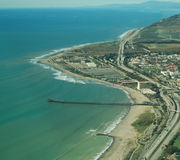
|
|
References
- ↑ City of Ventura, UCSB Economic Forecast Project, Volume 13, February 2006.
- ↑ Murphy, Arnold L. (ed.) (1979). A Comprehensive Story of Ventura County, California. Oxnard, CA: M & N Printing. pp. 8.
- ↑ "Spanish and Mexican Land Grants". Ventura County Genealogical Society. http://www.venturacogensoc.org/SpanGrants.htm. Retrieved 2007-03-17.
- ↑ http://www.greywolfphotos.com/ Grey Wolf Photos
- ↑ http://www.ustream.tv/channel/ventura-raceway-live Ventura Raceway Channel
- ↑ "US Gazetteer files: 2000 and 1990". United States Census Bureau. 2005-05-03. http://www.census.gov/geo/www/gazetteer/gazette.html. Retrieved 2008-01-31.
- ↑ Ventura Beach Realty
- ↑ "American FactFinder". United States Census Bureau. http://factfinder.census.gov. Retrieved 2008-01-31.
External links
- Ventura Wiki
- Guide to Ventura, California by locals
- Ventura Visitor's and Convention Bureau
- Ventura.com
- Ventura @ The Official Conejo Valley Website, a Web site with local history, events, and community information.
- Bell Arts Factory
- Ventura Port District
- Ventura Harbor
- City of Ventura
 |
Carpinteria Santa Barbara U.S. 101 |
Ojai SR 33 |
Santa Paula Santa Clarita SR 126 |
 |
| Pacific Ocean | Saticoy Moorpark and Simi Valley SR 118 |
|||
| Pacific Ocean Channel Islands |
Oxnard Port Hueneme Malibu U.S. 101 SR 1 |
Camarillo Los Angeles U.S. 101 |
|
|||||||||||||||||
|
|||||||||||||||||||||||||||
|
|||||||||||
|
|||||||||||||||||||||||
|
|||||||||||||||||
